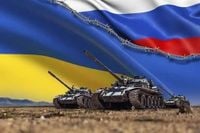As the conflict in Ukraine continues to unfold, Russia's stance on negotiations and ceasefire conditions has become increasingly complex. According to Ivan Us, a political scientist from the National Institute for Strategic Studies, Russia is likely hesitant to engage in serious negotiations. Vladimir Putin's primary aim remains to win the war, but the economic difficulties facing Russia are forcing a shift in the conversation.
Us highlighted that the financial problems within the aggressor nation are becoming more pronounced. He warned that the economy could potentially come to a standstill, drawing parallels to the collapse of the Soviet Union. "Due to huge expenses on the war, the Russian elite are losing a lot of money, which causes excitement among them," Us explained.
In a notable development, the Central Bank of Russia had already predicted back in 2024 that a 'renewal' of the Russian National Welfare Fund could occur in 2025. This forecast adds to the growing concerns about the financial stability of the nation as it continues to fund its military operations.
Interestingly, Us pointed out that there are signs of discontent among Russia's elite, with some even negotiating with foreign leaders independently of the Kremlin. A conflict has reportedly arisen between the Kremlin and Chechen leader Ramzan Kadyrov, who is engaging in talks with Middle Eastern monarchies without Moscow's approval. This situation is causing frustration within the Russian government.
Us noted that these internal dynamics may have prompted Putin to discuss negotiations with Ukraine to end the war without preconditions. Dmitry Peskov, a representative of the Kremlin, echoed this sentiment, stating that there is a possibility for negotiations, but they must be handled discreetly.
In a recent interview with CBS News, Russian Foreign Minister Sergei Lavrov outlined the conditions under which Russia would agree to a ceasefire in Ukraine. He emphasized that Moscow would only consider an unconditional ceasefire if specific requirements were met, primarily the complete cessation of arms supplies to the Ukrainian military.
Lavrov asserted, "President Putin said we are focused on a ceasefire, but we want guarantees that it will not be used again to strengthen the Armed Forces of Ukraine and that arms supplies must be stopped." This statement underscores Russia's insistence on controlling the terms of any potential ceasefire.
Despite the insistence on these conditions, Lavrov also indicated that Russia is open to seeking a balance of interests regarding Ukraine and the United States. However, he firmly stated that Russia is not prepared to make concessions at this time.
The evolving situation in Ukraine highlights the intricate balancing act that Russia faces as it navigates both military and economic pressures. The Kremlin's desire to maintain control over the narrative while managing its internal elite's discontent complicates the prospects for peace.
As discussions about negotiations and ceasefire conditions continue, the international community watches closely. The implications of these developments could have far-reaching consequences not only for Ukraine but also for the broader geopolitical landscape.
In summary, the current discourse surrounding negotiations and ceasefire conditions reflects a significant shift in Russia's strategy, driven by economic realities and internal pressures. As the situation unfolds, it remains to be seen how these factors will influence the future of the conflict in Ukraine.

